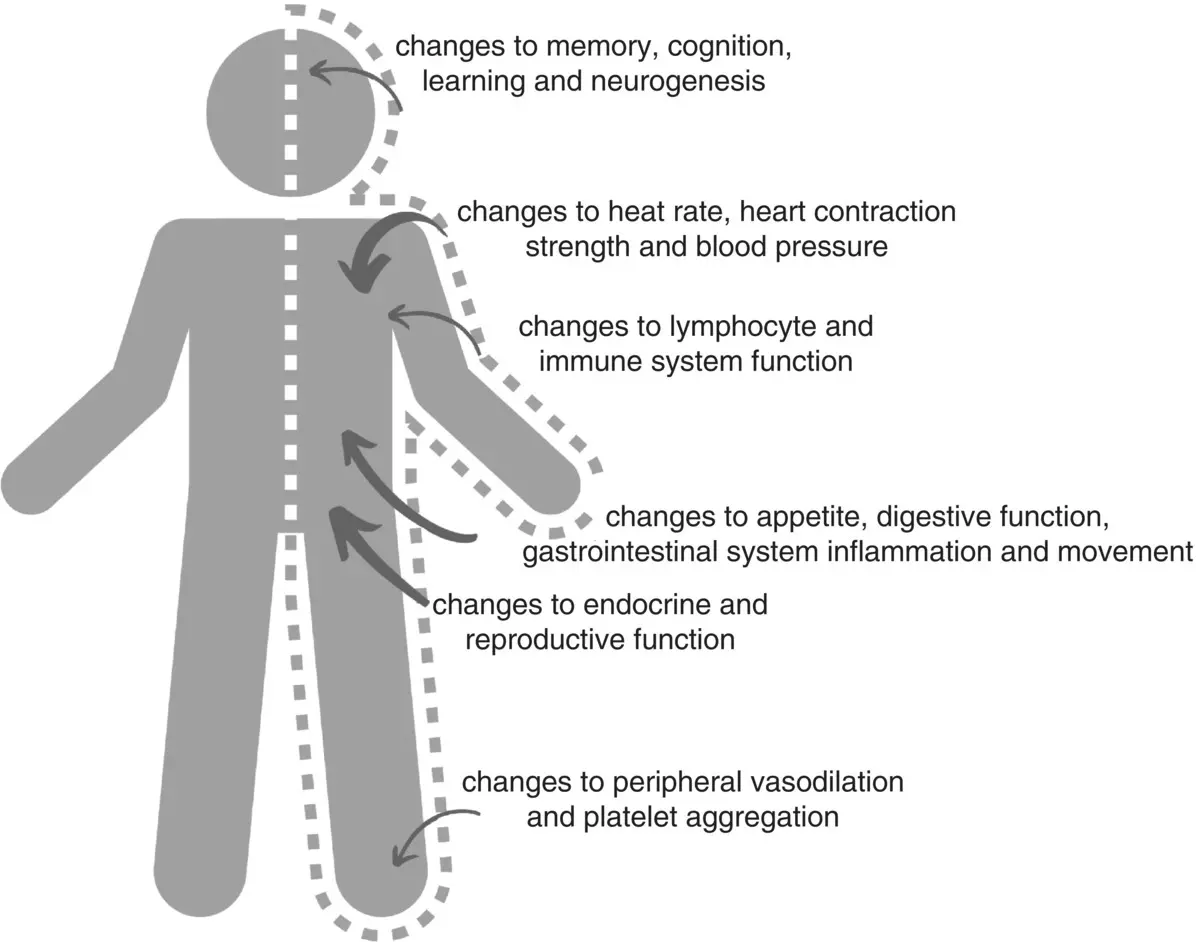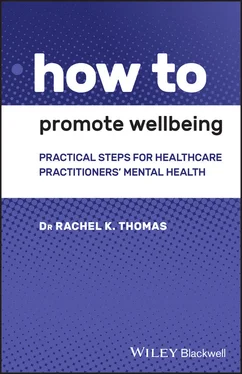
Figure 1.4 The stress response can impact on many different body systems. 14
The sympathetic nervous system stimulates the adrenal medulla to produce catecholamine such as epinephrine. The hypothalamic‐pituitary adrenocortical axis is also activated. Corticotropin releasing factor from the hypothalamus stimulates adrenocorticotropin from the pituitary gland. This stimulates cortisol secretion from the adrenal cortex.
Cortisol and catecholamines act to liberate energy sources by:
Increasing glycogen conversion into glucose
Increasing fat break down into energy sources such as glycerol and fatty acids.11
In young, healthy people, an acute stress response will more likely lead to a level of adaptation, rather than creating an actual health burden. 11,13. However, in less healthy or older people, it is more likely that repeated stress responses may be damaging to their health. 11
Under chronic stress, this acute response may be repeatedly activated without resolving. Given the actions listed above of the acute stress response, continuous activation may lead to physical problems such as:
Increased blood pressure
Vascular hypertrophy
Immune suppression
amongst other issues.
We know that prolonged exposure to stress is a risk factor for mental health conditions such as depression. 14Prolonged stress can also exacerbate the symptoms of conditions such as bipolar and schizophrenia. 14
Exposure to stress over long periods of time is likely to affect our efficiency at work. Evidence confirms that two out of three healthcare workers report significantly high levels of work stress, according to a UK workplace stress report. 15It is clearly time to start doing something differently. Almost all of the healthcare workers – 95% – reported that the stress impacted tangibly on their lives, and almost half (47%) felt that their work‐related stresses led them to suffer anxiety.
One in two health care workers in the UK reported that work‐related stress has led to them suffering anxiety.
We use the pre‐frontal cortex (PFC) region of our brain for many tasks that our daily jobs require us to successfully perform. The so‐called ‘higher executive functions’ include planning, decision‐making, and problem‐solving. The PFC area is one of the most sensitive to stress. 14We have good research evidence that our PFC is impaired under stress, leading to decreases in functions such as working memory. 16Many of our required tasks as clinicians require the optimal functioning of our PFC, so it stands to reason that learning to manage our stress will help us be more effective in our work in various ways. When being stressed impairs our decision‐making ability, this has the potential to impact negatively on patient outcomes – thus our work stress may lead to further work stress in a negative cycle.
Reduced functioning may also be linked to behaviours we fall back on during periods of stress, such as losing self‐control, overeating, smoking, or excessive drinking. 14
Problem factor: The diathesis‐stress model
Numerous health conditions are categorised according to genes and their environmental interactions. 17The diathesis‐stress theory is the increased risk of a condition, such as depression, calculated by multiplying the impact of the genes by the environmental impact. 17
‘Diathesis’ is a person’s predisposition towards an illness, based on their specific set of biological factors. 17
Much research supports an association that is significant between stressful life events and major depressive disorder. 17Some of this even suggests that in more than half of the cases of depression, there is an instance of severe adversity. 18The converse is also supported as true – that some of us will not present with cases of depression after severe life events. This evidence supports the idea that the symptom development is related to the complex interaction between how vulnerable and individual is – diathesis – and the stress that they are subject to. 17
This model, which has been applied to many different psychopathologies, highlights that any periods of increased demand may be considered as stress. However, this may be a relevant way of viewing the impacts of crises and pandemics in the healthcare system, as these may be considered as serious life events for many clinicians. This reinforces the fact that during and after such events, additional support may be required, as we cover below.
We can do little about our genes, except perhaps to attempt to promote positive epigenetic changes in order to possibly affect their expression. We can, however, influence our environments – if not at the time of crisis or significant life event, then hopefully immediately after. Where we are unable to alter our external environment, we may potentially be able to at least change our internal – psychological – environment.
According to this model, there are certain points in life which act as serious life events. These may then, in turn, trigger mental health conditions in those of us who may, for many different reasons, have a genetic or biological vulnerability. We have little insight into predicting who has these vulnerabilities; however, with this information, we can aim to offer improved support to everyone in the wake of such events. This, in a healthcare context, may relate particularly to crises and pandemics which may act as such a trigger, as may other complex clinical cases.
Studies looking at the impact of COVID‐19 on healthcare practitioners are also revealing the impact this crisis has had on us. One multi‐centre study with 1,257 front‐line staff in Wuhan, China found that healthcare staff who were involved in the care of patients with COVID‐19 were associated with a greater risk of depression, insomnia, and anxiety symptoms. 19Their levels of these symptoms were significantly higher than those of their colleagues in secondary roles, with men less likely than their female colleagues to report such symptoms.
Mental health issues are subject to greater stigma than many other health conditions. 20While there are an increasing number of conversations on mental health in the wider community, it is still a highly stigmatised area with regard to its impact on clinicians and other health professionals. There are a range of different resources for support with aspects of mental health for the general public, but there are significantly fewer specifically for clinicians. While these resources are relevant and supportive of anyone and everyone, the specific concerns of healthcare practitioners may at times need more specific support.
This stigma can create barriers to being able to seek access to care. 21It can have different components– the emotional, the behavioural, the cognitive – as well as activities on different levels – the structural, the interpersonal, and the intrapersonal – that can be active all at once. 21
Stigma may still act as a significant barrier to accessing mental health resources for clinicians .
There is an extensive amount of research, some of which will be discussed in the coming pages, supporting the facts that clinicians are generally late to seek help for mental health conditions or to disclose their own mental health conditions. Despite treating patients with similar conditions, we are generally reluctant to seek help for ourselves.
By aiming to improve our own conversations that we have around our own mental health and wellbeing, we can also aim to improve the care that we can ultimately deliver to our patients.
Читать дальше













